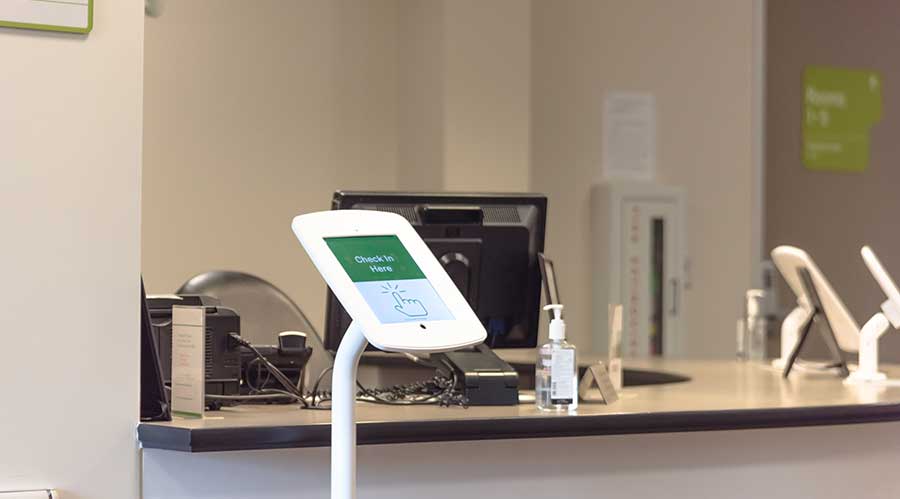
By embracing a customer-focused approach, healthcare systems can foster trust, improve patient satisfaction and enhance the overall quality of care.
Visitors entering healthcare facilities all too often encounter a maze of corridors, glaring lights and windowless, enclosed spaces. Compare that experience to a day of shopping at clothing and furniture stores, and it is completely different. Large windows often bring in natural light, bright and colorful touches appeal to customer preferences, and the layout of most stores is intuitive and clear.
While retailers promptly adjust to the evolving demands of their customers, healthcare systems often expect patients to acclimate to their environments, regardless of how impersonal they might feel. It is a stark contrast to the retail industry’s emphasis on customer satisfaction.
Healthcare facility managers must recognize the importance of enhancing the patient experience by borrowing a page from the retail industry’s playbook. The customer-centric approach that retailers have honed over time serves as a guideline for healthcare facilities. The pandemic has pushed retail to take ideas from healthcare for infection control and conversely healthcare has been looking at retail to become more humanistic.
By embracing a customer-focused approach, healthcare systems can foster trust, improve patient satisfaction and enhance the overall quality of care. By connecting brands and patients, focusing solely on individual patients, digitizing the process and customizing the in-person experience, healthcare systems can integrate the tools of consumer-focused industries into their facilities.
Connecting brands and patients
Retailers have demonstrated the power of creating multiple connection points between their brand and customers, fostering strong brand loyalty. In the healthcare world, by providing individuals with safe and inviting environments that are easily accessible, managers can similarly cultivate lasting relationships with patients.
Just as retail brands seek to establish an emotional connection with consumers, healthcare facilities can achieve the same connection by providing spaces that are not only physically secure but also emotionally supportive. When these facilities prioritize creating connection points with patients, they lay the foundation for establishing trust. By offering safe and welcoming spaces for patients, these facilities send a clear message that the wellbeing and comfort of individuals are a priority. This sentiment resonates with patients, creating a sense of confidence and loyalty toward the healthcare provider.
Focusing on individuals, not systems
Older generations predominantly rely on traditional healthcare approaches, while younger generations have started placing a greater emphasis on their overall wellbeing and self-care. The shift towards prioritizing wellbeing has paved the way for the expansion of the wellness industry. This emerging sector emphasizes the idea of individuals as consumers rather than just patients, highlighting their role in managing their health. This consumer-centric outlook is centered on tailoring healthcare systems to meet individuals’ expectations and specific needs.
The consumer-focused approach within the wellness industry also recognizes that individuals are not passive recipients of healthcare but rather active participants in their wellbeing. As the healthcare system shifts towards a more personalized model, individuals can receive tailored experiences that meet their expectations. Today’s patients want to be active partners in their healthcare journey by making informed decisions about their health.
Digitizing the process
In today’s healthcare landscape, it is important to understand the needs and expectations of highly digital customers and provide end-to-end experiences that satisfy them. Retailers have excelled at this digital aspect by prioritizing their customers and leveraging data to gain insights into their behaviors and preferences. In healthcare systems, it is important to adapt to understand the digitally savvy customer and create seamless experiences throughout their healthcare journey.
Just as retailers use customer data to refine their offerings and build brand loyalty, healthcare facility managers can leverage digital tools and technologies to gain insights into patient behaviors. This data-driven approach allows healthcare providers to create customized experiences that cater to individual needs and result in improved patient satisfaction. Some examples of digital tools and technologies include telemedicine and online retail. A holistic approach is needed to address all patient needs and preferences.
Understanding the highly digital customer includes recognizing the importance of multiple touchpoints throughout the healthcare journey. By offering a comprehensive range of touchpoints, healthcare systems can cater to the preferences of digitally savvy customers, ensuring convenience and accessibility at every stage.
Customizing the in-person experience
To truly understand customer values and expectations, healthcare systems can learn valuable lessons from retailers by embracing transparency in pricing, reducing friction throughout the healthcare process and placing a strong emphasis on personal and community wellbeing. Just as retailers have recognized the importance of these factors in building customer loyalty, healthcare facilities can adopt similar concepts and tailor them to their customer base, resulting in enhanced brand awareness, streamlined processes, customized experiences and increased access to care.
Retailers understand the significance of addressing individual needs and building connections within communities. No healthcare system will be successful without understanding their customer values. These systems can tailor their services to promote personalized care and community engagement. By actively fostering a sense of wellbeing and belonging, healthcare providers can strengthen their relationships with customers and build loyalty.
Healthcare systems have a great deal to gain by adopting a consumer-centric approach inspired by the practices of the retail industry. By creating connection points with patients, focusing on the individual rather than the system, digitizing the healthcare process and customizing the in-person experience, healthcare facilities can improve trust, patient satisfaction and quality of care for individuals.
The shift towards prioritizing the patient as a consumer requires healthcare systems to understand and adapt to the needs of the highly digital customer, while also embracing transparency, reducing friction, and promoting personal and community wellness. By integrating these concepts into their practice, healthcare facilities can create a more personalized healthcare experience that benefits patients and providers.
Brian Cravens is practice group manager, Healthcare West, with Arcadis. Parry Lagro is practice group manager, Healthcare East, with the firm.
The post "Revitalizing Healthcare: Lessons from the Retail Industry " appeared first on Healthcare Facilities Today








0 Comments